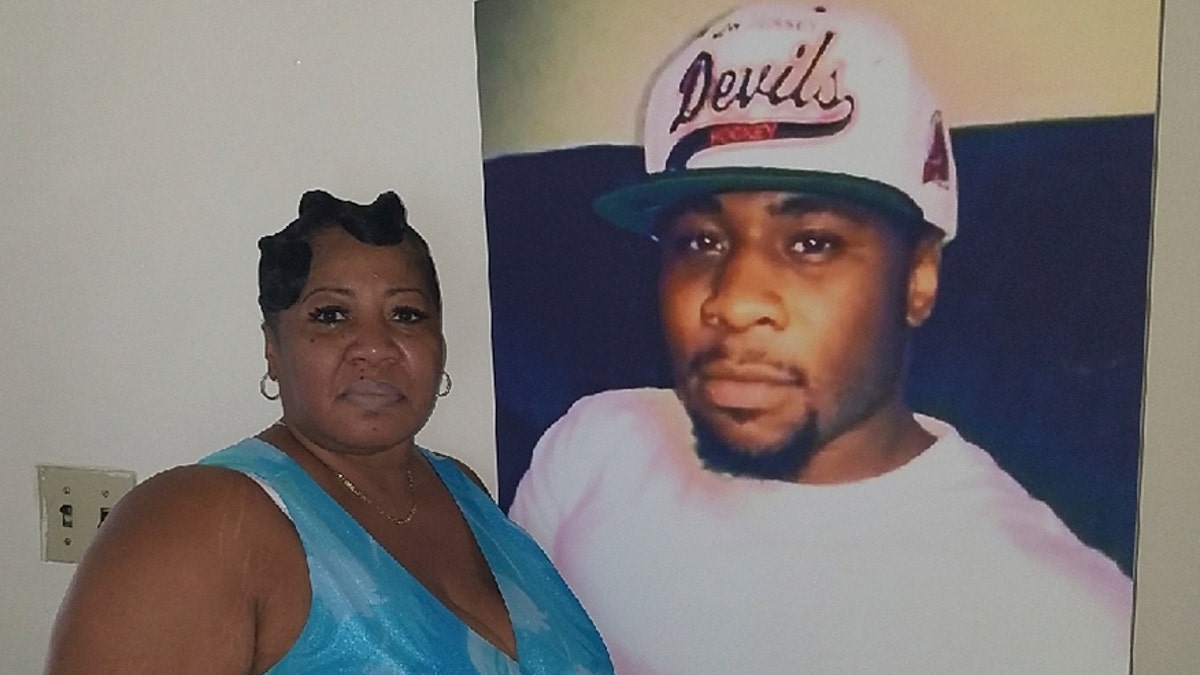
June Rodgers in front of a picture of her son Christian.
On a Sunday last April, 26-year-old Christian Rodgers was returning from a convenience store in New Jersey when he was shot and killed by a convicted felon who had just been released from jail under the state’s new bail reform laws.
The victim's mother, June Rodgers, is now suing New Jersey Gov. Chris Christie over what she says was a failure to protect her son. She claims the murder would never have happened had the state not relied on a controversial computer program to assess the probability a person will re-offend.
"My son was shot 22 times as he tried to run away from this man," Rodgers said through tears in an interview Wednesday.
"He was a really good kid. He was kind hearted," Rodgers told Fox News, saying she was "shocked" upon learning the alleged shooter had been released from jail days before following an arrest on a gun charge.

Governor Chris Christie of New Jersey in Washington, June 16, 2017 (REUTERS/Joshua Roberts)
"There was hurt all over again," she said. "I got the sense that my son was killed for nothing and that it could have been prevented. Had they still had the old system, someone would have been keeping an eye on this guy."
The lawsuit's defendants include Christie and the state's attorney general, Christopher Porrino. The suit says the shooting suspect, 30-year-old Jules Black, was not detained because of bail reforms that went into effect earlier this year.
Supporters of the reforms say they were enacted as a way to keep violent criminals detained until trial while providing poor, low-level offenders the chance to be freed. But critics say it has led to some people being hastily released because they weren't considered a threat and then later rearrested on new charges.
At the heart of the Rodgers lawsuit is a computer program that purports to accurately predict the probability a person who has been arrested will commit another crime or fail to show up for court. The risk assessment tool -- a key feature of the bail reform that took effect on January 1 -- was designed by the Arnold Foundation and championed by Christie.
Jeff Clayton, executive director of the American Bail Coalition, claims that using a computer program to make such predictions "violates the common sense test."
"The tool is sacrosanct in a lot of ways," Clayton told Fox News. "This is an over reliance on science and the algorithm to predict human behavior.
"The problem here is that a human being did review the case but relied instead on a computer rather than what I would consider the obvious facts," he said.
Duane "Dog" Chapman, the former star of "Dog the Bounty Hunter," announced last week that he is joining the legal effort to have New Jersey's new bail rules tossed out. When questioned about the pending lawsuit, Christie told a reporter, "Bring it on."
The Republican governor said the reforms are meant to ensure pubic safety while also preventing low-risk offenders from remaining detained because they can't afford bail.
"Obviously the bail bond industry makes a lot of money off poor people. I mean, it’s disgraceful, and we’ve changed the system now so that if you’re — if you are poor in this state and are charged with a crime you should not have to stay in jail for being poor," Christie said during an Aug. 2 press conference. "Being poor is not a crime."
"Now, are there going to be times when people who get out of jail prior to trial commit other crimes? Yes, but is that a justification for mandating that every person stay in jail? I say no ... I welcome the lawsuit," he said.
Jules Black, meanwhile, has been charged with murder and weapons charges stemming from Rodgers' murder. He remains jailed, and his attorney has maintained his client's innocence, according to the Associated Press.
Mario Williams, an attorney with Nexus Caridades Inc., who is representing Rodgers, said he hopes the lawsuit might lead to change within the state's current bail reform measures.
"The issue is not whether Jules Black would have gotten out under the old bail system. The issue is that Governor Christie and the Arnold foundation forced the public to accept a risk assessment program that assesses the risk, to the public, of violent felons such as Jules Black at near zero," Williams said, claiming Black had been incarcerated more than 15 times on sexual assault and gun charges.
"New Jersey tax payers have to ask Christie one simple question: how could you have our best interest at heart by promoting a risk assessment program that failed to take into account charges such as sexual assault and previous gun charges?" he said.

